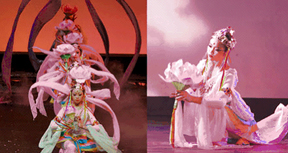 Are you ready to party like it’s 4037? Well, according to the traditional Chinese calendar, that is what year it will be on Jan. 29. UNMC and The Nebraska Medical Center will sponsor several activities to honor Chinese New Year – the oldest and most important festival observed each year by Chinese people around the world.
Are you ready to party like it’s 4037? Well, according to the traditional Chinese calendar, that is what year it will be on Jan. 29. UNMC and The Nebraska Medical Center will sponsor several activities to honor Chinese New Year – the oldest and most important festival observed each year by Chinese people around the world.
What many people call “Chinese New Year” is actually the annual Spring Festival. Because the Chinese use a lunar calendar, the date of the Spring Festival changes each year. While the Gregorian calendar used in the western world is only 425 years old, the Chinese calendar is over 4,000 years old.
There are different stories about the origin of Chinese New Year. “The Legend of Nian” tells the story of how thousands of years ago, on every New Year’s Eve, people had to flee to safety to a nearby mountain to avoid the man-eating monster “Nian” (Chinese word for “year”). One year, an elderly monk came to the village and used three magic weapons – firecrackers, a New Year couplet (short verse) and lights – to subdue the monster. The people celebrated for several days during which they visited, exchanged gifts, danced and ate.
The rotating cycle of 12 animal signs is a folk method for naming the years in traditional China. Animal names for each year in the 12-year cycle are: rat, ox, tiger, rabbit, dragon, snake, horse, sheep, monkey, rooster, dog and boar. People born in each of these years are said to have certain characteristics.
This is the Year of the Dog. People born in the Year of the Dog are said to be honest and loyal. As with the more familiar system of Zodiac signs, each symbol of Chinese astrology covers a wide range of human emotions and traits.
One practical aspect to the Chinese system is that children do not have to learn a new answer to the question, “How old are you?” every year. Elderly Chinese people can even lose track of their age because they are rarely asked their current age. Everyone simply remembers that he or she was born in the year of the dog, sheep or dragon. For example, people living today born in the Year of Dog are 0 (new born), 12, 24, 36, 48, 60, 72, 84 or 96 years old.
Chinese people share a host of foods, decorations and activities during the 15-day celebration of the Chinese New Year. Some of these items and actions include:
- Dumplings (family reunion); nian gao, cake baked in a way that, the higher it rises the better the year will be; fish for long life and good fortune; oranges and tangerines for wealth and good fortune; when company stops by a “prosperity tray” is served filled with red dates, melon seeds and New Year cakes.
- The entire house is cleaned before New Year’s Day. On New Year’s Day, all brooms, brushes, dusters, dustpans and cleaning equipment are put away. Sweeping and dusting is forbidden on that day for fear that good fortune will be swept away.
- At the stroke of midnight on New Year’s Eve, every door and window of the house must be opened to allow the old year to go out.
- Nobody washes their hair on New Year’s Day for fear they will wash away good luck for the New Year. Knives and scissors are not used that day lest good fortune be cut off.
- If one cries on New Year’s Day, he or she will be crying all through the year, so children are tolerated and never spanked, even when they are mischievous. Negative words, including the word “four” (which in Chinese sounds like the word for death), are not uttered. References to the past year and references to death or dying and telling ghost stories are taboo on New Year’s Day.
The celebration of the Chinese New Year is now such an international phenomenon that there is a world tour of the Chinese New Year Global Gala, “Myths and Legends.” This year, the touring group of traditional Chinese performance artists will tour 17 cities around the world. The gala is filled with incredible performances in dance and music, from gentle maidens to solemn guards to a great dragon.
Chinese people in North America often celebrate the New Year on Jan. 1, as well as their own traditional Chinese New Year. Either way, they wish one and all a happy new year – Hongxi Fa Chai, “Wish You a Good Fortune.”
See the UNMC Today “Announcements” for details on the medical center’s Chinese New Year activities, which include a tea service performance (Jan. 30), cafeteria menu (Jan. 30), gala videotape showing (Feb. 2) on campus and Chinese Spring Festival celebration (Feb. 11).
To learn more about the Chinese New Year, visit http://www.chinapage.com/newyear.html. If you cannot attend the campus viewing of the gala videotape, visit http://newyeargala.ntdtv.com.
Dongmei Liu, M.D., research associate, UNMC department of cellular/integrative physiology, contributed to this article.